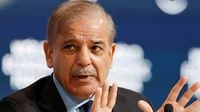In a critical meeting on Friday, May 9, 2025, the International Monetary Fund (IMF) board will review its financing facilities extended to Pakistan amid rising tensions with India and concerns over the country’s economic stability. This meeting comes on the heels of India's strong opposition to further bailouts for Pakistan, particularly in light of allegations surrounding the diversion of funds towards terrorism following the Pahalgam terror attack on April 22, 2025.
Pakistan's economy is in dire straits, with external debt exceeding $130 billion and foreign exchange reserves dwindling to just over $15 billion, barely enough to cover three months of imports. The looming maturity of over $22 billion in public external debt in the upcoming fiscal year adds to the urgency of the situation. This precarious financial state means that Pakistan cannot afford a prolonged military conflict with its neighbor, India, especially as it seeks to stabilize its economy.
New Delhi has made its stance clear, urging the IMF board members to consider the facts carefully before extending further financial assistance to Pakistan. Foreign Secretary Vikram Misri stated that India’s executive director at the IMF will present New Delhi's position during the meeting, emphasizing the need for the board to reflect deeply on Pakistan's track record with previous bailout packages.
"Pakistan has received 24 such packages from the IMF, but few have reached successful conclusions," Misri noted. He highlighted the importance of assessing the situation thoroughly before making decisions that could impact the region's stability.
Despite these challenges, Pakistan managed to secure a $7 billion bailout package from the IMF in September 2024, which was structured to be disbursed in 37 installments. The latest South Asia Development Update from the IMF projects a modest economic growth for Pakistan, forecasting an increase to 3.1 percent in the financial year 2025-26, up from 2.7 percent in the previous year. However, the IMF has warned that tight macroeconomic policies aimed at rebuilding fiscal buffers may constrain growth.
In a surprising twist, Pakistan's Economic Affairs Division recently requested additional loans from international partners, citing heavy losses due to retaliatory actions from India. However, this request was later denied by Pakistani officials, who claimed that their X account had been hacked. The Ministry of Economic Affairs stated, "We are working to have the Twitter (X) switched off," insisting that the appeal for more loans was not sanctioned by them.
As the IMF deliberates on Pakistan's financial future, the stakes are high. The country is grappling with a severe cash crunch, with external debt repayments projected at $100 billion over the next four years. Minister of State for Finance Ali Pervaiz Malik has previously indicated that nearly two-thirds of Pakistan's public revenue is now consumed by interest payments, leaving little room for essential government services.
Moreover, the economic landscape has worsened significantly in recent years, exacerbated by political unrest and natural disasters, including devastating floods in 2022. According to the World Bank, the lower-middle-income poverty rate in Pakistan stood at 42.3 percent for the fiscal year 2024, with an additional 2.6 million people falling below the poverty line compared to the previous year.
Pakistan's reliance on external financing has made it vulnerable to geopolitical tensions, particularly with India. Moody's Ratings recently cautioned that sustained escalations in tensions could weigh heavily on Pakistan's growth prospects and fiscal consolidation efforts. The ratings agency noted, "A persistent increase in tensions with India could also impair Pakistan’s access to external financing and pressure the country’s forex reserves, which remain well below what is required to meet its external debt payment needs for the next few years."
As the IMF board meeting unfolds, the implications of its decisions could resonate far beyond Pakistan’s borders. Experts warn that a prolonged military conflict with India would not only exacerbate Pakistan's already fragile economic situation but could also impact India's economic stability, albeit to a lesser extent. India's macroeconomic conditions are currently stable, supported by strong public investment and private consumption, and it appears better equipped to weather the economic fallout of any escalation.
Yousuf Nazar, a former head of Citigroup’s emerging markets investments, recently highlighted the risks that prolonged hostility poses to Pakistan's agriculture sector, which employs nearly 40 percent of the labor force. He noted, "A single crisis could trigger economic collapse and mass suffering. For Islamabad, avoiding significant escalation could be a question of survival."
Additionally, the energy sector in Pakistan has become a major point of macro-fiscal risk, with circular debt issues intensifying over the years. The IMF has pointed out that high and unpredictable energy costs have negatively impacted economic activity and development in the country. With the energy sector relying heavily on imported fuels and facing inefficiencies, the situation remains precarious.
As the world watches, the outcome of the IMF meeting could set the tone for Pakistan's economic recovery or further entrench its financial woes. The country stands at a crossroads, needing to balance immediate financial needs with the long-term structural reforms necessary to stabilize its economy.
In summary, Pakistan's financial future hangs in the balance as it seeks to navigate the complexities of international finance amid regional tensions. The decisions made at the IMF board meeting today will be pivotal in determining whether Pakistan can secure the funding it desperately needs to avert a deeper economic crisis.





